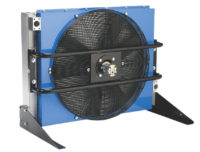AIR COOLED HEAT EXCHANGER
Air Cooled Heat Exchangers are a type of heat exchanger design commonly used in mobile applications where a liquid coolant supply isn’t available, such as automotive and construction vehicles. As the name suggests, air cooled heat exchangers provide a cooling solution for fluids using air, which is driven through a fin core by an electrical, hydraulic, or mechanically driven fan. Air Cooled Heat Exchangers can be supplied to cool a single fluid, such as engine water, or a combination of fluids as part of a cooling pack, which can often include 3 fluid circuits cooled by a single fan.
Welltech specializes in the design and production of custom-built air cooled heat exchangers for various applications and operational conditions.

KEY CHARACTERISTICS
- Nearly all heat exchangers proceed as a heat sink, everywhere they are fast dissipating heat interested in the air that was built up at a new location..
- Air cooled heat exchangers are used by following reasons : They enlarge plant good organization, they make not necessitate an supplementary water supply.
ADVANTAGES OF AIR COOLED HEAT EXCHANGER
- Air cooled heat exchangers are used by following reasons : They enlarge plant good organization, they make not necessitate an supplementary water supply.
- Over 200 fin surfaces available including louvered and low-clog options
- All designs are application specific, ensuring efficient and cost effective design
- Minimum batch size of 10 units
- Typically air-cooled exchangers consist of a finned tube bundle with rectangular box Headers on both ends of the tubes.
- Cooling air is provided by one or more fans.
- Usually, air blows upwards through a horizontal tube bundle.
- The fans can be either forced or induced draft depending on whether the air is pushed or pulled through the tube bundle.
- The fans can be either forced or induced draft depending on whether the air is pushed or pulled through the tube bundle.

